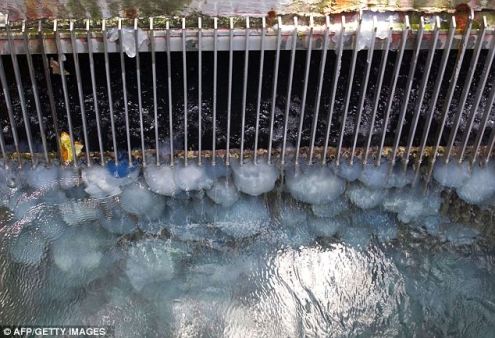The Prime Minister of Japan wants “an ‘ice wall’ to run a mile around the site. No such wall that size has ever been built, and this one could not be in place for at least two years.” Meanwhile, the Japanese wonder what to eat and drink, while humanity collectively daydreams…can Tepco be contained?… A door opens into a museum. On the wall is Salvador Dali’s painting of distorted pocket watches, “The Persistence of Memory.” We call it “surreal.” A door opens inwards. On a wall of visionary fog (or dry ice, if you’re the Prime Minister of Japan) is whatever you need to see that night. We call it a “dream.” If deluded or fantastical, a “pipedream.” In 1949, in an effort to thwart the tide of totalitarianism, George Orwell wrote the fictional novel 1984, but now, in 2013, police-state world news is often called “Orwellian.” Which came first, chicken or egg? reality or fiction? dream or art? The pocket watches continue to melt but now it is mostly because of climate revolt and the dreamtime become realtime. Evo Morales, Bolivia’s Indigenous President, has said that “…the Mayan calendar’s 21 December 2012 is the end of the non-time and the beginning of time.”1 Art... myth… prophecy… dream... time melting into the theater-of-the-absurd inside a theater, or the theater-of-the-absurd of the so-called real world that often bears little resemblance to reality. Do they all spring from something beyond the great Either/Or? The unified-dualist’s answer would be a resounding “Yes.”
Big gulp! “[Arnie] Gundersen [a Vermont-based nuclear engineer] long ago recommended Tepco dig a trench filled with zeolite to protect the site from the water flowing down from the mountains. He was told there was not enough money available to do the job... Gundersen and 16 other experts have filed a list of suggestions with UN Secretary-General Ban Ki-Moon. Thus far there’s been no official response.”2 Perhaps most amazing is how this story is not one of the biggest news stories going. While some may be worrying about NSA surveillance, what about the Tepco workers who, as of late, have been behaving like restaurant waitpersons in training, “Oooops, sorry I spilled your radioactive beverage, looks like the cup has a leak. Can I get you a new cup?” Can someone please speak to the manager?! Speaking of the NSA, recent news shows that MLK Jr. was right after all (not that I doubted him): “The arc of the moral universe is long, but it bends towards justice.” Though, in this case the justice speaks of poetic powers beyond our control: “The super-secret NSA Utah Data Center is suffering from a number of massive electrical jolts which, in turn, have melted hundreds of thousands of dollars of equipment. According to a WSJ report, the explosions, called ‘arc failures,’ are like ‘lightning’ inside a computer case… The center uses 65 megawatts of electricity or about as much needed to power 65,000 homes at a cost of $1 million per month.”3 Wait, instead of the government spending all that money to power its Utah Data Center, what if at least a good chunk of it (gotta save some to protect against evil-doers) went to help with there being “enough money” to solve the nuclear problem in Fukushima.
After three days, though, “the pipes had been cleaned of the jellyfish and engineers were preparing to restart the reactor.”4 Ah, jellyfish pipedreams! In his book Revolutions & Revolutionary Movements, James DeFronzo lists five factors that, historically, have contributed to successful revolutions; jellyfish are not one of them. One factor, however, has to do with division or dissidence among elites – “groups that have access to wealth, power of various types, or are highly educated and possess important technical or managerial skills.” Following this educated research into another room in the museum of dreams, what at first seems absurd then becomes potentially good news (if you’re not an elitist); the USEmpire has arrested its own Representatives: “Democratic Reps. Charles B. Rangel and Joseph Crowley of New York, Raul M. Grijalva of Arizona, John Lewis of Georgia and Luis V. Gutierrez and Jan Schakowsky of Illinois were among those loaded into police vans. U.S. Capitol Police said they would be charged with ‘crowding, obstructing and incommoding,’ which is a misdemeanor.” Never mind thinking, what were they doing? Well, simply “...demanding meaningful and immediate legislative action to correct the abysmal treatment of immigrants in the U.S. and the continued stalemate that meets the issue in Congress.”5 But, until the paradigm shift really hits the DC fan, abysmal treatment begets abysmal treatment. On the other coast, in California, a seeming solution for a lot of our energy problems is being thwarted by power-grid control-and-profit-freaks: “...the state's three largest utilities—Edison International, PG&E Corp. and Sempra Energy—are ‘putting up hurdles’ to homeowners who have installed sun-powered energy systems... The utilities argue that customers with solar energy-storing batteries might be rigging the system by fraudulently storing conventional energy sent in from the utility grid, storing it in the batteries, and then sending it back to the grid for credit. The solar companies say there is no proof that this is happening.”6 “Rigging the system”? Oh, the irony! Nikola Tesla, who individually faced the same essential hurdles, may soon become the new Spartacus poster boy for the “rooftop revolution.” Such revolutions would, of course, be helpful for changing The System, yet let’s remember that many people would appreciate getting a roof, first. Yet and still, some prefer “evolution” over a shift of power doomed to be followed by the next shift of power, which is, too often, what revolutions are. Evolution is a loaded word but for simplistic sake, let’s call it a steady, peaceful progression with positive change, also allowing for such changes to happen suddenly. While we fuss, write, wrangle, protest and justifiably clamor for change, I can’t help but wonder if the most real changes will come from the fog of dreams, from jellyfish and the mouths of babes, from “arc failures,” common sense and compassion. Perhaps, too, they will come from the likes of Stanislav Petrov. You can read the various layers to the story but in essence: “On September 26, 1983, he was the duty officer at the command center for the Oko nuclear early-warning system when the system reported that a missile was being launched from the United States. Petrov judged the report to be a false alarm, and his decision is credited with having prevented an erroneous retaliatory nuclear attack on the United States and its NATO allies that could have resulted in large-scale nuclear war.”7 Curiously, “Petrov asserts that he was neither rewarded nor punished for his actions.” While the effective use of surrealism, absurdity, satire and whatever methods deemed worthy of conveying an idea or image to We the People deserves applause, when it comes to controlling and fixing rambunctious nuclear plants and suchlike, in the words of Inspector Kemp in Mel Brooks’ “Young Frankenstein”: “Before we go around killing people, we had better make damn sure of our evidence.”8 Or in the case of an emergency, give it all the calm intuitive-logic that can be mustered. Perhaps the Tepco silver-lining is a wake-up call as to how far humanity’s energy supply hubris and cheap ass, unscientific building materials can go. For a current assessment of what’s happening with Tepco and Fukushima, watch Harvey Wasserman’s ten minute video talk. PopularResistance.org reports:
Readers can take action with this petition calling for “international intervention” and “global media access.” In a potentially positive chain reaction:
Mankh (Walter E. Harris III) is an essayist and resident poet on Axis of Logic. In addition to his work as a writer, he is a small press publisher and Turtle Islander. He edited and published the book,The (Un)Occupy Movement: Autonomy of Consciousness, Practical Solutions, Human Equality,"Between the Lines: listening to literature online." You can contact him via his literary website. Notes
|


